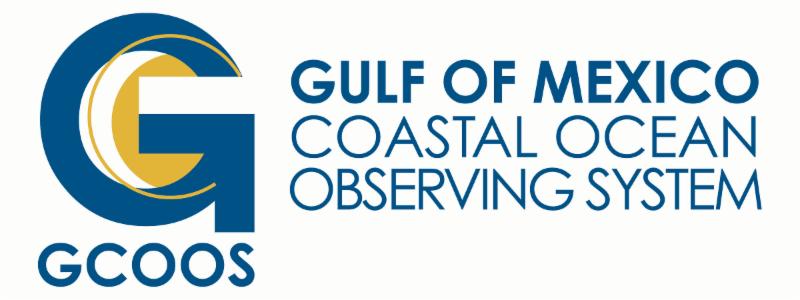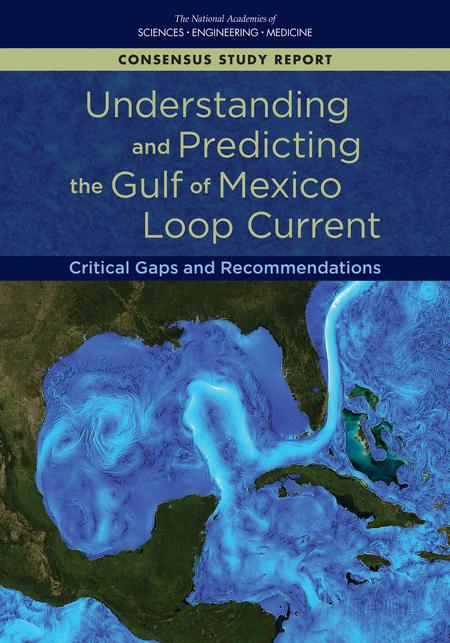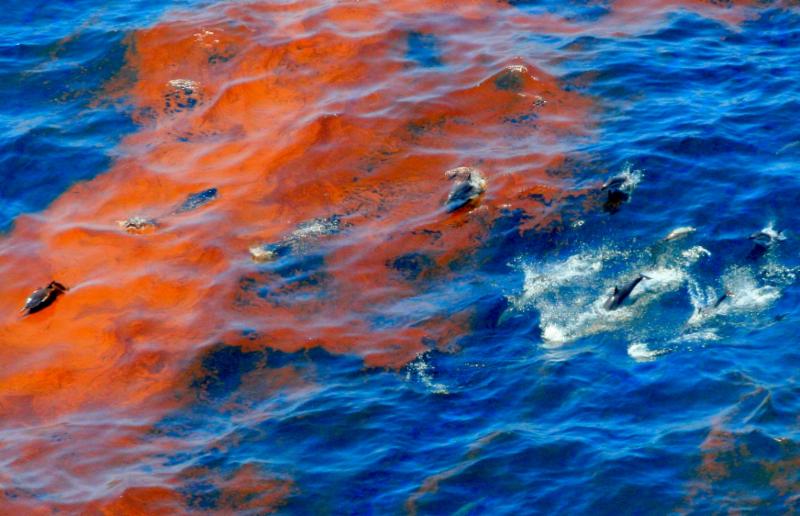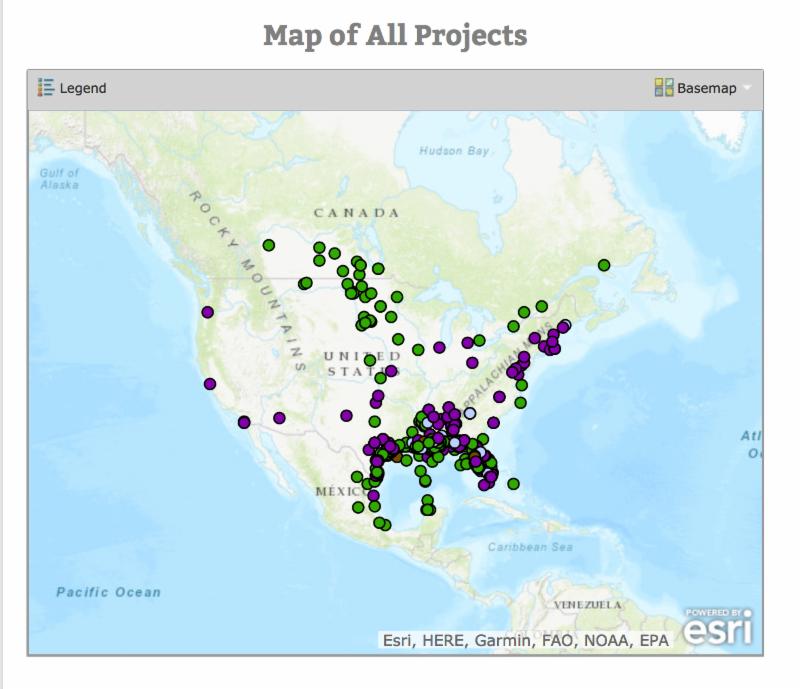
|
GCOOS is the Gulf of Mexico regional component of the U.S. Integrated Ocean Observing System (IOOS). Our mission is to provide timely, reliable and accurate information on the open and coastal ocean waters of the Gulf of Mexico to ensure a healthy, clean, productive ocean and resilient coastal zone.
|
|
|
|
March 2018 - In This Issue:
|
|
|
|
|
Greetings,
During the first week of March, IOOS hosted the annual RA Director's meeting in Washington, D.C. It was a memorable and moving opening when Director Carl Gouldman asked the group to take a moment to remember Dr. Matt Howard, who embodied the spirit of IOOS collaboration.
We'll be announcing our own tribute to Matt during our
annual Members Meeting in New Orleans, so please be sure to attend if you can.
But probably the biggest news this month is the
request for applications released by the Gulf Research Program. We believe this comprehensive campaign of research, observation and analysis activities can make a huge difference in our ability to forecast the Loop Current, thus furthering our understanding of the physical environment of the Gulf of Mexico (GoM) and associated biological and operational impacts and help make the Gulf a safer place to work and play.
Over the years, GCOOS has developed a robust data portal that consolidates observations using industry format and attribute standards for the GoM into a one-stop-shop for data discovery and download.
Our efforts on the data portal continue and we want to make sure you consider us as your data managers for any Loop Current related projects. GCOOS is a Regional Information Coordination Entity (RICE), a certification made by the U.S. IOOS Program that recognizes the strong program and data management activities of our organization.
If you'd like to learn more about partnering with GCOOS on data hosting or other projects, please contact me so we can discuss working together to generate a strong, collaborative submission to the GRP.
Barb Kirkpatrick
Executive Director
|
|
|
Nadine Slimak, Public Relations & Content Marketing, Vetted Communications, LLC
|
|
|
Board Elections Now Open
|
Ballots are out to voting members of GCOOS for our annual board elections.

If you're a voting member of GCOOS and have not received your ballot link via email, please contact Research Associate Jennifer Vreeland-Dawson.
|
Register Now: GCOOS Annual Members Meeting
|
|
Registration is now open for the Annual GCOOS Members Meeting in New Orleans on April 19 and we've got some exciting speakers on the agenda this year.
- William Burnett, Technical Director to the Commander, Naval Meteorology and Oceanography Command/ Task Group, will give us an update on the Navy's underwater glider test bed.
- Ruth Perry, Shell Marine Scientist and Regulatory Policy Specialist and GCOOS Board Member, will talk about some exciting new public/academic/industry partnerships that Shell is coordinating with federal agencies and the academic sector.
|
|
|
- Zenon Medina-Cetina, Associate Professer in the Zachry Department of Civil Engineering at Texas A&M, will share information about the Georisk Initiative.
- Kent Satterlee, President of
 |
|
 |
Naval Oceanographic Office (NAVOCEANO)
at the Stennis Space Center.
|
Kent Satterlee & Associates LLC, will discuss the conversion of offshore platforms to research and monitoring stations.
- Juan Carlos Herguera, Principal Researcher, Department of Marine Ecology, Center for Scientific Research and Higher Education at Ensenada, Mexico, will discuss CIGOM: Consortium of Investigations in the Gulf of Mexico.
- Porfirio Alvarez, Executive Secretary for the Consortium of Marine Research Institutions of the Gulf of Mexico and the Caribbean, will provide an update on high frequency radar projects in the Southern Gulf of Mexico.
The afternoon will include updates from GCOOS Executive Director Dr. Barbara Kirkpatrick and staff, IOOS Program Office Director Carl Gouldman and subcontractor reports. The GCOOS Board of Directors will also meet in closed sessions on April 18 and April 20.
Details
- What: GCOOS Members Meeting, Open Session
- When: 8 a.m. to 5 p.m. April 19 (lunch is on us)
- Where: Doubletree Hotel, 300 Canal Street, New Orleans, LA
- RSVP: Required; register now
- Hotel: Please contact GCOOS Research Associate Jennifer Vreeland-Dawson before March 26 for hotel accommodations at our discounted rate.
|
|
What's Next: GCAN Webinar
|
Our next speaker in the GCAN Webinar Series is Dr. Stephan Howden, Physical Oceanographer at the University of Southern Mississippi. He will present "Autonomous monitoring of ocean acidification parameters in the hypoxic zones of the northern Gulf of Mexico" at 1 p.m. EST March 27.
GCAN's mission is to identify critical vulnerabilities of the Gulf of Mexico
 ecosystem that may be impacted by ocean acidification, foster collaborations to increase ocean observations and develop strategies to mitigate impacts from ocean acidification.
About the Speaker: Dr. Howden received a B.S. in Physics from the State University of New York at Buffalo in Buffalo, NY; an M.S. in Physics from Michigan State University in East Lansing, MI; and a Ph.D. in Oceanography from the University of Rhode Island in North Kingston, RI. Dr. Howden is currently an Associate Professor in the Department of Marine Science, and his publications include microwave remote sensing, the Integrated Ocean Observing System, ecosystem monitoring, mesoscale ocean variability, hydrographic science and precise positioning. Dr. Howden is the Director of the Central Gulf of Mexico Ocean Observing System and he serves on the Board of Directors of the Gulf of Mexico Coastal Ocean Observing System, as a member of the Steering Committee for the Gulf of Mexico Coastal Acidification Network, and as a member of the IOOS High Frequency Radar Working Group. He was a member of the Program Advisory Committee for the Ocean Observatories Initiative, from 2013 until it ended in 2015.
Speaking of ocean acidification:
Check out the new OA Information Exchange website. This new collaboration website focused on ocean acidification has been created to share information and catalyze responses to OA. The "OA Information Exchange" is a joint project of the NOAA OA Program, Interagency Working Group on OA and the Northeastern Regional Association of Coastal Ocean Observing Systems. Members of the OA Information Exchange are using the site's collaborative tools to share resources, engage in online discussions, develop collaborations and interact with people in other disciplines and regions to build a well-informed community working to respond and adapt to ocean acidification. Anyone with an interest in OA can join the OA Information Exchange.
Once users request access they can begin to post content and hold discussions with colleagues. Users can also join multiple teams, which are self-forming groups focused on specific geographic regions or topics within the broader theme of ocean acidification, and sign up for alerts on specific topics of interest.
You can participate in Dr. Howden's webinar through the new OA site after you request access to participate.
|
GRP Loop Current RFA
|
Following on the heels of the recent report on the Gulf of Mexico Loop Current
 released by the Gulf Research Program (GRP), the National Academies' GRP has now released a request for applications called "Understanding Gulf Ocean Systems."
The
Loop Current report, released in January, called for an international, multi-institutional campaign of complementary research, observation and analysis activities that would help improve understanding and prediction of the Loop Current System.
The RFA focuses on the report's near-term recommendations, which address activities that can be started before extensive planning for a larger research campaign has gotten under way.
The total award in this funding period will be up to $10 million for grants of up to 24 months. Applications are due by 5 p.m. EST April 25. Awards will be selected and winning applicants notified in Summer-Fall 2018.
This solicitation is the first of several funding opportunities for research aimed at improving understanding and prediction skills of the Loop Current System. Proposed observations, analyses and modeling should specifically address recommendations for near-term activities identified in the consensus report "Understanding and Predicting the Gulf of Mexico Loop Current: Critical Gaps and Recommendations." These near-term activities can be started or accomplished without extensive planning and are meant to either jump start or inform the design of a long-term (10-year), integrative program.
|
|
GOMA All Hands Meeting & Tools Café
|
Registration is now open for the
Gulf of Mexico Alliance's All Hands Meeting; back for a third year, the Gulf of Mexico Alliance Data and Monitoring Team is hosting the Tools
 Café to coincide with the reception on Tuesday, June 12, 2018.
The 2018 All Hands will be held at the Hilton Bayfront Downtown, St. Petersburg, Florida. The Group rate is $139/night or the prevailing government rate, call 1-800-445-8667 and mention "Gulf of Mexico Alliance Meeting."
The Tools Café provides an opportunity for partners to demonstrate their online or paper-based tool(s). The activity is intended to be an interactive experience to learn how the resources work. Submissions are due by Friday, April 13, 2018 to
[email protected].
Other news from GOMA:
Gulf TREE officially launched this month. Funded through a grant from EPA to the Gulf of Mexico Alliance, Gulf TREE's primary function is to help users filter through more than 100 climate resilience tools for the Gulf Coast to find relevant tools with ease and confidence.
|
The Gulf Sea Grant oil spill outreach team will host a free seminar, "Oil spill response, assessment, and restoration: Marine mammals," on March 29, 2018 in Galveston,
 Texas. Experts will share the latest science concerning marine mammal populations, with a focus on their health after oil spills and protocols relating to response, assessment, and restoration. A discussion about integrating science, response, and management for marine mammals will follow talks from our guest speakers. This event will also be available as a webinar.
|
|
Deepwater Horizon Tracker Updates Made
|
The Gulf of Mexico Alliance and partners, Ducks Unlimited and The Trust for Public Land, continue to build the Deepwater Horizon Project Tracker launched in April 2015. 
Recent project updates to the Tracker include: RESTORE Council bucket 2 and 3 projects, NFWF Gulf Environmental Benefit Fund awards, NAS Gulf Restoration Projects, NRDA edits to existing projects, and updates to Department of Treasury materials. Only funded projects and programs are included in the Tracker.
|
Restoration Funding Calendar
- NOAA RESTORE Act Science Program hosts a three-year calendar that consolidates planned funding opportunities
By State:
|
|
Interior Announces Date for Largest Oil and Gas Lease Sale in U.S. History
|
Deputy Secretary of the Interior David Bernhardt announced that the Department will offer 77.3 million acres offshore Texas, Louisiana, Mississippi, Alabama, and Florida for oil
 and gas exploration and development. The region-wide lease sale, which is the largest in U.S. history, is scheduled for March 21, 2018, and will include all available unleased areas in federal waters of the Gulf of Mexico. In 2017, offshore leases helped the Department raise a billion dollars more in revenue for the year than was made off energy revenues in 2016.
|
The Gulf Coast Ecosystem Restoration Council has released the 2017 Annual Report to Congress. The annual report summarizes calendar year activities and accomplishments.
|
|
Army Corps Report to Congress
|
Each year, the Assistant Secretary of the Army for Civil Works develops a Report to Congress on Future Water Resources Development: A list of potential studies and projects that can be considered for congressional authorization. The 2018 Report to Congress is now available.
|
|
NOAA Education Accomplishments Report
|
In fiscal year 2017, NOAA's education programs reached more than 2.5 million youth and adults. And more than 4,400 postsecondary students received training in NOAA-related fields. Learn about these efforts and more in the 2017 NOAA Education Accomplishments Report, now available online.
|
|
Joint Technology Transfer Initiative
|
NOAA's Oceanic and Atmospheric Research (OAR) Service Office of Weather and Air Quality (OWAQ), (through the Joint Technology Transfer Initiative (JTTI)) is soliciting proposals to conduct research and development activities related to advancing data assimilation of new observations and data assimilation techniques for convective-scale weather prediction, improving water prediction capabilities through enhancements to National Water Model, improving daily to subseasonal scale prediction of Arctic sea ice, and communicating forecast uncertainty.
- Additional information is available at grants.gov. The FFO can be found by searching for "Joint Technology Transfer Initiative" or NOAA-OAR-OWAQ-2018-2005496.
|
|
Ocean Acidification Graduate Research Fellowships
|
|
The Mid-Atlantic Sea Grant Programs (MASGP), in partnership with the NOAA Ocean Acidification Program (OAP), are pleased to announce the availability of Ocean Acidification (OA) Graduate Research Fellowships for the two- year period covering the 2018 and 2019 academic years. The fellowship is open to full-time graduate students at any academic institution in Delaware, Maryland, New Jersey, New York and Virginia who are engaged in coastal and marine research relevant to regional ocean, coastal, and estuarine acidification. In addition to supporting the student's academic expenses, the fellowship will provide additional professional development opportunities throughout its duration, focusing on science communication, management application, outreach, and other Sea Grant and OAP activities and mission priorities. Proposals are due at 5 p.m. ET on Friday, April 13, 2018.
|
|
Postdoctoral Research Position in Phytoplankton Ecology and Small-Scale Fluid Dynamics
|
The Villareal Laboratory of Phytoplankton Ecology (University of Texas) and the Gemmell Laboratory of Marine Ecology and Biological Fluid Dynamics (University of South Florida) are seeking a postdoctoral researcher to investigate dynamic sinking patterns of marine diatoms and the resulting small-scale fluid dynamics associated with this behavior. The successful candidate will work with a productive team of researchers to advance our understanding of essential processes that regulate sinking patterns in marine diatoms and how changes to the surrounding physical fluid environment modify these sinking behaviors.
Essential functions: Conduct research and analyze data: Utilize novel methods and instrumentation to collect and analyze biological and fluid dynamics data. Write manuscripts: Develop and publish multiple first-author manuscripts, contribute to additional papers. Mentor graduate students and interns: Work closely with graduate and undergraduate student participants. Disseminate results at conferences: Present results at symposia; interpret and disseminate results to management agencies and non-science audiences
Qualifications: The candidate must have a Ph.D. in marine science, ecology, or a related field. The preferred candidate will have experience in phytoplankton ecology and basic fluid dynamics as well as the demonstrated ability to publish peer reviewed manuscripts. The candidate will also be expected to participate in field work that may require physical effort to transport equipment in field sites throughout coastal Texas and Florida. The ability to work in a group setting is essential, as the postdoctoral researcher will work collaboratively with other PIs, post docs, graduate and undergraduate students, and research associates/technicians. High organizational and communication skills, creativity in methodological development, and understanding of basic experimental design and statistical analyses are required for this position. Salary is competitive and commensurate with experience.
Duration and Start Date: The appointment is for 1 year with the possibility of a second year pending satisfactory performance and funding. The position is available immediately. Review of applications will commence as they are received and continue until the position is filled.
To Apply: Send 1) a cover letter that describes your interest in the position, career goals and details your work/educational experience most relevant to the position, 2) curriculum vitae, 3) up to 3 relevant reprints, and 4) contact information for 3 references to Dr. Brad Gemmell with "Postdoc position" in the subject line.
|
|
PhD Candidates: Ifremer, Laboratoire Phycotoxines
|
PhD proposal: Chemical diversity and ecology of the genus Gambierdiscus in Atlantic waters, focus on Gambierdiscus excentricus and ciguatoxins in the Caribbean
PhD Supervisor: Philipp HESS , PhD, HDR (Ifremer, Laboratoire Phycotoxines) http://annuaire.ifremer.fr/cv/17128/en/ , if interested please contact prior to application:
[email protected]
Co-supervisor: Rodolphe LEMEE (Lecturer Sorbonne Université, Laboratoire Océanographique de Villefranche)
Additional advisor: Samuel Bertrand (Lecturer Université de Nantes, Laboratoire Mer Molécules Santé)
Laboratoire/unité, département d'accueil: ODE/DYNECO/PHYC
Doctoral School: Ecole Doctorale des Sciences de la Mer et du Littoral, Université de Bretagne Loire (https://ed-sml.u-bretagneloire.fr/fr), Université de Nantes.
Cofinancing guaranteed : 50 % Ifremer
Cofinancing currently sought : 50% Région des Pays de la Loire (spring 2018)
Employer: Ifremer
Application deadline: 30 April 2018
- Title, abstract and keywords
Ciguatera fish poisoning (CFP) has been known for centuries in the Caribbean, and the French Antilles. Following recently growing poisoning events in the Canary Islands, dinoflagellates of the genus Gambierdiscus have been implicated in such events in the Canaries. Studies of the Phycotoxin laboratory of Ifremer, in collaboration with colleagues from the Beaufort laboratory of NOAA, confirmed that the species Gambierdiscus excentricus produces strong toxicity of both maitotoxin (MTX) and ciguatoxin (CTX) type. An analogue of MTX, MTX4, was identified and shown to be present in all strains of this species, so far originating from the Caribbean, the Canary Islands and from Brazil. The thesis will aim at: (i) identification of CTXs in Gambierdiscus excentricus; (ii) clarification of the chemical diversity of the genus Gambierdiscus to underpin the potentially major role of G. excentricus in the Atlantic Ocean; and (iii) evaluating the ecological role of MTX or CTX analogues towards microalgal competitors and predators of the dinoflagellate Gambierdiscus. To achieve these aims, the student will use mass spectrometric and bioguided fractionation techniques previously developed at the Phycotoxins laboratory and at University of Nantes, and will benefit from the experience of the Laboratoire Océanographique de Villefranche in terms of chemical ecology of benthic micro-algae.
Profile sought
Candidates applying must have a degree enabling them to start a PhD (according to the Bologna Convention). This PhD project will particularly suit candidates that have an (honours) degree in analytical, biological or pharmaceutical sciences.
General interest
At European level, Ciguatoxins have been identified as a priority since May 2012 at EU and national reference laboratory level. At international level, Ciguatera has been considered as a priority since April 2013 (Intergovernmental Panel on Harmful Algal Blooms and GEOHAB final open science workshop, Paris, France). In France, Ciguatera has been increasingly a problem in both overseas areas and in fish imported into the metropolitan area.
Originality
(i) Linkage of bioguided fractionation with high resolution mass spectrometry for the identification of novel algal metabolites
(ii) Use of high resolution mass spectrometry for comparative metabolomics and molecular networks for dereplication and metabolite diversity mining
(iii) Co-culture of Gambierdiscus with other marine organisms (competitors and predators) for identification of ecologically relevant algal metabolites
Collaborations with external laboratories
Co-supervision of the PhD with Rodolphe Lemée (MCF HC HDR, UMPC, Laboratoire Océanographique de Villefranche = LOV); several study visits are planned during year 2 and 3, especially to verify the ecological role of MTXs and CTXs produced by species of the genus Gambierdiscus. The LOV has put biological models in place in previous and ongoing PhD theses (Aurélie Boisnoir, Anne-Sophie Pavaux) for the evaluation of benthic dinoflagellates from Guadeloupe and the Mediterranean.
A close collaboration is ongoing with the University of Nantes (=UN), for the isolation of hitherto un-identified algal and fungal metabolites. Samuel Bertrand (MCF, UN), who will also co-supervise the student, has solid experience in the preparative isolation of natural products, metabolomics in co-culture and for dereplication. Prof. Christine Herrenknecht, has strong background in chromatography and experience in structure elucidation.
A collaboration is ongoing with Wayne Litaker (Beaufort Laboratory, NOAA, USA). This group is internationally recognised for culture and morpho-molecular diversity of the harmful algae, especially the genus
Gambierdiscus. A study visit with this group is possible thanks to formal agreements. Other collaborations are also ongoing with Francisco Rodriguez (IEO). An MoU has been signed with the Institut Louis Malardé for the exchange of materials including toxins and algal extracts ; collaborative projects on related themes are ongoing with the head of this group Mireille Chinain (CARISTO-Pf, GlobalCig...). Another ongoing project (EuroCigua, EFSA, 2016-2020) facilitates exchange at European level, especially the group at University of Vigo (Prof. Ana Gago). An offer of staff exchange for a research visit has also been expressed by the Université of Alabama (Alison Robertson) who has a major project on a related theme ongoing in the Gulf of Mexico. Finally, a convention has been signed between Ifremer and the International Atomic Energy Agency (Marie-Yasmine Bottein, head of radio-ecology laboratory, Monaco). Study visits
of the successful PhD student will depend on appropriate qualification and orientation of the student.
|
2018
March
Consortium for Ocean Leadership; Power of Partnership - Advancing Ocean Sciences and Technology
March 7, 2018, Reserve Officers Association Building, One Constitution Avenue NE, Washington, D.C.
Reception 6:00-8:00 PM Dirksen Senate Building, Room G50
May
The joint OCEANS and Techno-Ocean meetings at the Kobe Convention Center, Kobe, Japan
June
June 11-14, 2018, Hilton Bayfront Downtown, St. Petersburg, Florida
June 10-15, 2018, Victoria, British Columbia, Canada
|
|
Share Your News with GCOOS
|
Do you have a meeting, job or funding announcement? Please let us know so we can help spread the word. Email info, including all pertinent details and website links, to Laura Caldwell, GCOOS Staff Assistant, [email protected].
Are you starting or finishing a research project, reporting new findings, have a new publication or other big news to share with the GCOOS community? Please email our Public Relations and Content Coordinator, Nadine Slimak at Vetted Communications, [email protected].
|
|
|
|
|